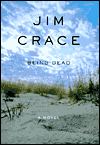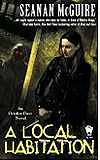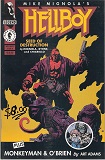
Being Dead, by Jim Crace
Book Review by Louis Maistros
Have you read this book?
Lovers of literary dark fiction will not want to miss this one. Weighing in at a lean, mean 196 pages, "Being Dead" by Jim Crace has all the unlikely impact of a telephone book to the forehead. It is one of those rare reading experiences, like Joseph Conrad's "Heart of Darkness" or J.D. Salinger's "Nine Stories", that forces you to pull to the side of the road after every few pages to meditate on what your brain just took in. The thoughts and sentiments here are not quickly digested. And they stay with you. Crace possesses a rare gift as a writer.
The story is simple and odd. Joseph and Celice are two aging zoologists, 30 years married. Now in their mid 50s, their lives are tediously, "geometrically" in order. In a fit of nostalgia, the pair decides to visit the place where they first
made love -- and where a tragedy occurred -- on the rugged dunes of Baritone Bay. Their visit is cut short by a man with a rock who caves in their skulls on the beach for sandwiches and spare change. Nude and bloodied in the sand, Joseph's dying gesture is at once pathetic and heroic; he lifts his hand and places it on Celice's leg. This is where it will remain for six days. These six days are the span of the book.
Joseph's haunting last stand is at the heart of the book's message. Crace underlines it beautifully at the story's onset:
"This is our only prayer: May no one come to lift his hand from her leg. Let thunder never find its voice. Hold sound and light, those battling twins, apart. There is a meadow that separates death's chilly gate and the tumbling nothingness beyond, in which our Joseph and Celice are lying, cushioned by the sunlight and the grass, and held in place by nothing firmer than his fingertip."
The novel zigzags between four points in time; their first day on that beach 30 years previous to the murder, the hours leading up to their deaths, the slow realization by friends and family that something is wrong, and the grim progress of the two bodies in decay during their undisturbed days in the sand.
The scene on the beach is ugly, even gratuitous at times. But it is also smartly poetic, making a compelling case that these ghastly days of decomposition are indeed Joseph and Celice's "period of grace". There is no religious or spiritual baggage in Crace's vision of death. Just bodies of the earth, returning to the earth. Life is precious and short. Death is poetic and just.
We expect that such lofty trappings will introduce us to the lives of two noble and romantic creatures. Not so. Joseph and Celice are a mind numbingly average couple who seem to have little understanding of each other after 30 years of marriage. She is disappointed with the dull life she has wound up with and can barely tolerate her husband. But she is also touchingly protective of him. He finds comfort in the mundane order of his life and worships his wife, though he knows the feeling is not exactly mutual. A part of him craves adventure but he is also terrified by the idea. Their lives are defined by their unwillingness to live. They have produced one daughter, Syl, who, quite naturally, is rebellious and resentful of them. They are the modern nuclear family.
When Syl receives word from Joseph's work that he is missing, her version of the six days comes in three phases; 1) annoyance at being bothered by it at all, 2) annoyance that her parents won't return her calls, 3) dawning concern.
The murder itself is visited on the reader repeatedly in the telling, from various points of view. Crace's prose is lilting and lyrical, but also is grounded in intentionally gratuitous detail and terrifying medical accuracy. As the killer sneaks up on the naked pair, Celice is sitting behind Joseph, stroking his chest. She is struck first:
"He felt the recoil first, her chin was banged against his head. Then he heard her splitting skull, its vacuum punctured. Just for an instant, he mistook the first wound, gasping at its gashes through the salty air like the red gills of a fish, for Celice's voice, a startled slush of pain as if she had been stung by ants or a wasp."
Crace assaults our senses again when Syl is "browsing" the unclaimed bodies in the local morgue. Her seedy guide doles out helpful hints for family members who opt to take their dead home:
"Relatives should not -- as many do -- remove the cotton from the rectum or the vagina when they've reclaimed their body for its lying in, the clerk explained with the tones of a helpful shop assistant detailing fabric care. That would be to take the stopper from the drain. Nor should they touch whatever they discover in the penis. It has been put there for a good purpose, not a joke."
While Syl suffers the horrors of the morgue attendant's monologue, Crace returns us to the beach, just to remind us that, all the while, Joseph and Celice remain prone to the elements. Silvered by thrashing rains, visited by swag-fly maggots, gulls and crabs. His finger on her leg.
The indignities of death are a running theme in "Being Dead", but the helpless horrors of the dead are hurled at us only to underscore their utter meaningless. Crace's message has to do with the nature of the ultimate undivorceable duo: life and death. They are the result of each other on many levels. Our lives are defined by our fear of death. Death is the invariable answer to even the most cautious life. Religion is not part of the equation. It is the living that matters most. And even the most ordinary, mundane life has beauty. Even the tiny lives that strip the corpses on the beach.
"We live, we die, we do not need to understand. There are no ghosts to lay. There is just ash and memory."
As dark fiction goes, this is a quiet novel. There are few jolts or plunges, no attributes of a carnival ride. This is a meditation of sorts. The waters run deep in Jim Crace's "Being Dead". It is one of those rare works that can alter the way you perceive things. Even the things that you've perceived with certainty your whole life.
Visit Louis' web site for more reviews and other cool stuff!
The story is simple and odd. Joseph and Celice are two aging zoologists, 30 years married. Now in their mid 50s, their lives are tediously, "geometrically" in order. In a fit of nostalgia, the pair decides to visit the place where they first
made love -- and where a tragedy occurred -- on the rugged dunes of Baritone Bay. Their visit is cut short by a man with a rock who caves in their skulls on the beach for sandwiches and spare change. Nude and bloodied in the sand, Joseph's dying gesture is at once pathetic and heroic; he lifts his hand and places it on Celice's leg. This is where it will remain for six days. These six days are the span of the book.
Joseph's haunting last stand is at the heart of the book's message. Crace underlines it beautifully at the story's onset:
"This is our only prayer: May no one come to lift his hand from her leg. Let thunder never find its voice. Hold sound and light, those battling twins, apart. There is a meadow that separates death's chilly gate and the tumbling nothingness beyond, in which our Joseph and Celice are lying, cushioned by the sunlight and the grass, and held in place by nothing firmer than his fingertip."
The novel zigzags between four points in time; their first day on that beach 30 years previous to the murder, the hours leading up to their deaths, the slow realization by friends and family that something is wrong, and the grim progress of the two bodies in decay during their undisturbed days in the sand.
The scene on the beach is ugly, even gratuitous at times. But it is also smartly poetic, making a compelling case that these ghastly days of decomposition are indeed Joseph and Celice's "period of grace". There is no religious or spiritual baggage in Crace's vision of death. Just bodies of the earth, returning to the earth. Life is precious and short. Death is poetic and just.
We expect that such lofty trappings will introduce us to the lives of two noble and romantic creatures. Not so. Joseph and Celice are a mind numbingly average couple who seem to have little understanding of each other after 30 years of marriage. She is disappointed with the dull life she has wound up with and can barely tolerate her husband. But she is also touchingly protective of him. He finds comfort in the mundane order of his life and worships his wife, though he knows the feeling is not exactly mutual. A part of him craves adventure but he is also terrified by the idea. Their lives are defined by their unwillingness to live. They have produced one daughter, Syl, who, quite naturally, is rebellious and resentful of them. They are the modern nuclear family.
When Syl receives word from Joseph's work that he is missing, her version of the six days comes in three phases; 1) annoyance at being bothered by it at all, 2) annoyance that her parents won't return her calls, 3) dawning concern.
The murder itself is visited on the reader repeatedly in the telling, from various points of view. Crace's prose is lilting and lyrical, but also is grounded in intentionally gratuitous detail and terrifying medical accuracy. As the killer sneaks up on the naked pair, Celice is sitting behind Joseph, stroking his chest. She is struck first:
"He felt the recoil first, her chin was banged against his head. Then he heard her splitting skull, its vacuum punctured. Just for an instant, he mistook the first wound, gasping at its gashes through the salty air like the red gills of a fish, for Celice's voice, a startled slush of pain as if she had been stung by ants or a wasp."
Crace assaults our senses again when Syl is "browsing" the unclaimed bodies in the local morgue. Her seedy guide doles out helpful hints for family members who opt to take their dead home:
"Relatives should not -- as many do -- remove the cotton from the rectum or the vagina when they've reclaimed their body for its lying in, the clerk explained with the tones of a helpful shop assistant detailing fabric care. That would be to take the stopper from the drain. Nor should they touch whatever they discover in the penis. It has been put there for a good purpose, not a joke."
While Syl suffers the horrors of the morgue attendant's monologue, Crace returns us to the beach, just to remind us that, all the while, Joseph and Celice remain prone to the elements. Silvered by thrashing rains, visited by swag-fly maggots, gulls and crabs. His finger on her leg.
The indignities of death are a running theme in "Being Dead", but the helpless horrors of the dead are hurled at us only to underscore their utter meaningless. Crace's message has to do with the nature of the ultimate undivorceable duo: life and death. They are the result of each other on many levels. Our lives are defined by our fear of death. Death is the invariable answer to even the most cautious life. Religion is not part of the equation. It is the living that matters most. And even the most ordinary, mundane life has beauty. Even the tiny lives that strip the corpses on the beach.
"We live, we die, we do not need to understand. There are no ghosts to lay. There is just ash and memory."
As dark fiction goes, this is a quiet novel. There are few jolts or plunges, no attributes of a carnival ride. This is a meditation of sorts. The waters run deep in Jim Crace's "Being Dead". It is one of those rare works that can alter the way you perceive things. Even the things that you've perceived with certainty your whole life.
Visit Louis' web site for more reviews and other cool stuff!
| Being Dead, by Jim Crace on Amazon |
Being Dead, by Jim Crace on Amazon

| More Books You Might Like |
Comment on Being Dead, by Jim Crace
| Comments on Being Dead, by Jim Crace |
| Posted by aaliya on 1/26/2014 |
| awesum book : |


